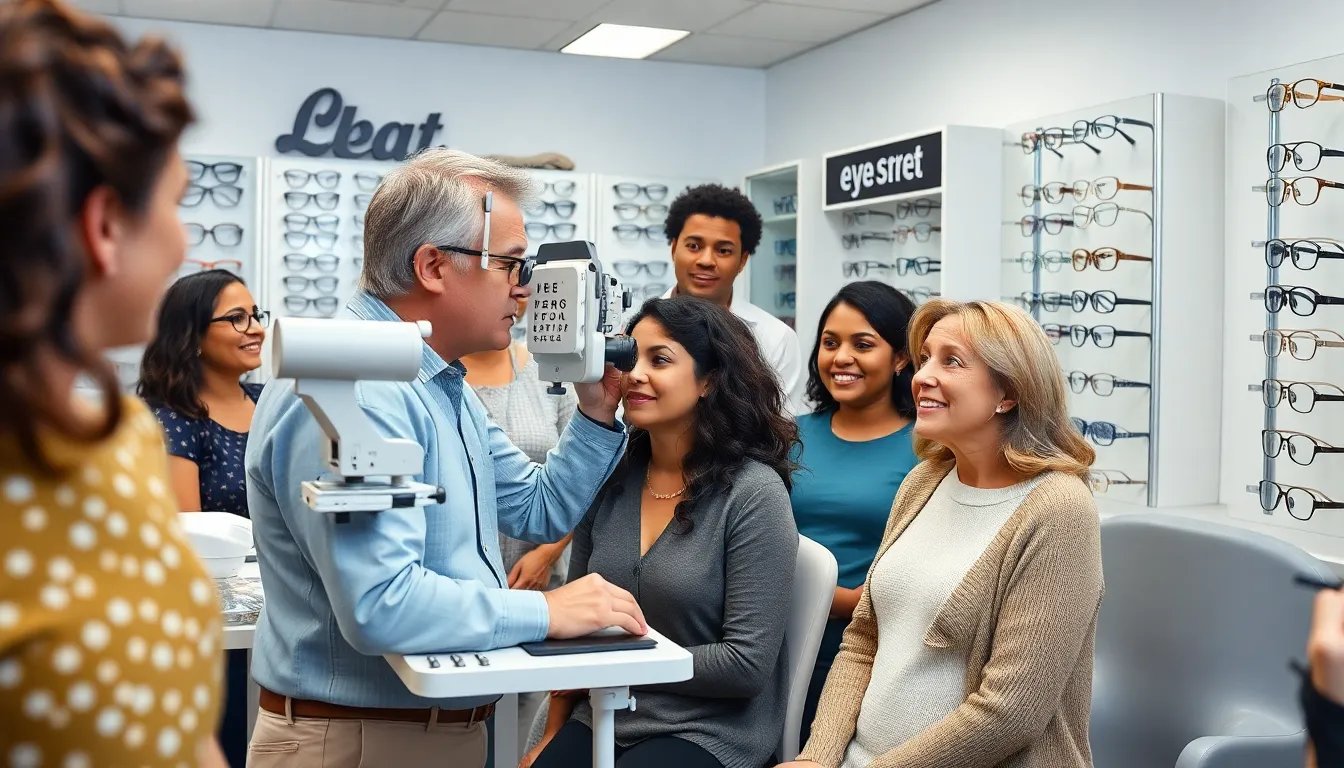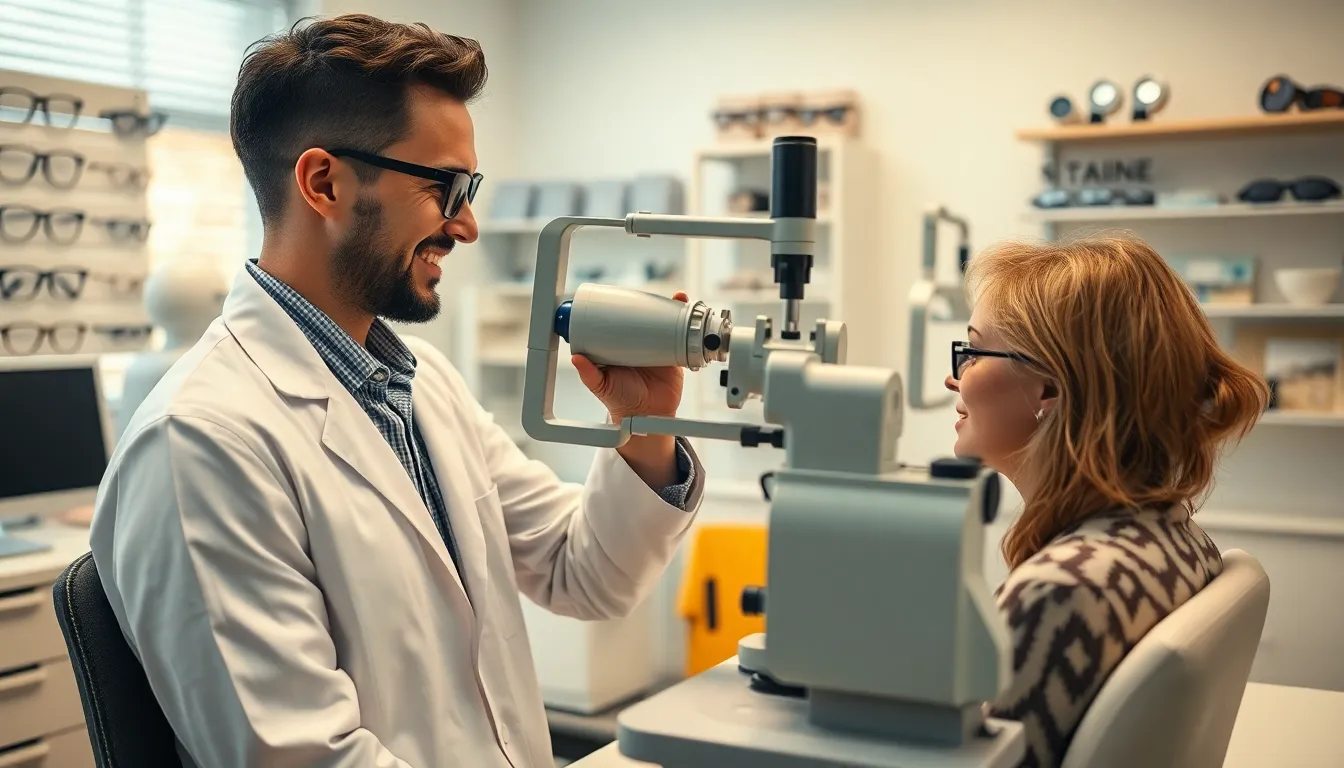Table of Contents
ToggleFinding the right place for an eye exam can feel like searching for a needle in a haystack—if that needle were wearing glasses and hiding behind a pile of outdated magazines. But fear not, because getting your peepers checked doesn’t have to be a daunting task. With a little guidance, you can easily pinpoint the best spots to keep your vision sharp and your style on point.
Understanding Eye Exams
Eye exams play a crucial role in maintaining vision and overall health. Regular check-ups help detect issues early, ensuring timely intervention.
Importance of Regular Eye Exams
Regular eye exams matter greatly for several reasons. They help identify eye diseases such as glaucoma or diabetic retinopathy early. Early detection often leads to more effective treatment and better outcomes. Consistent check-ups also allow for updates to vision prescriptions, improving daily activities, such as reading and driving. In children, these exams support healthy visual development, impacting learning and growth. Routine visits encourage preventive care, fostering a proactive approach to eye health.
Types of Eye Exams
Various types of eye exams exist to address different needs. Comprehensive eye exams assess overall eye health and vision accuracy. They include tests like refraction assessments and dilated eye exams. Contact lens fittings evaluate eye shape and prescription to ensure comfort and effectiveness. Specialized exams, such as ocular coherence tomography, provide detailed imaging for diagnosing specific conditions. Additionally, pediatric eye exams focus on children’s unique vision needs, ensuring they develop appropriately. Each exam type contributes significantly to maintaining optimal eye health.
Where to Get Eye Exam

Finding the right place for an eye exam involves several options. Each offers distinct advantages and services tailored to different needs.
Optometrists
Optometrists provide comprehensive eye exams, contact lens fittings, and vision-related healthcare. Patient care includes assessing refractive errors and exploring treatment options for common conditions like dry eye or glaucoma. Many optometrists also offer management of eye diseases, ensuring timely referrals for specialized care. Regular visits to an optometrist help maintain overall eye health.
Ophthalmologists
Ophthalmologists specialize in medical and surgical eye care. They perform complex procedures and surgeries for conditions like cataracts and retinal disorders. Patients may see an ophthalmologist for advanced eye issues or significant vision changes requiring in-depth evaluation. Regular consultations with an ophthalmologist help monitor and treat serious eye conditions, preserving long-term vision.
Optical Retail Chains
Optical retail chains combine eye exams with eyewear shopping. Many locations employ in-house optometrists, delivering convenient services under one roof. Customers can get prescriptions filled, explore frame options, and receive adjustments on-site. Skilled staff can assist in selecting lenses suited for specific lifestyles, ensuring satisfaction with purchases.
Community Health Clinics
Community health clinics offer accessible eye care, particularly for underserved populations. Many provide free or low-cost eye exams, helping bridge gaps in healthcare. Qualified professionals conduct exams, often focusing on preventive care and early detection of eye issues. These clinics ensure everyone has access to vision care, regardless of financial circumstances.
Online Eye Exam Services
Online eye exam services offer convenient options for vision assessments from home. Through telehealth platforms, patients complete vision tests and consultations via video. Products like glasses and contact lenses can be ordered directly online, reducing the need for in-person visits. While not a substitute for comprehensive eye exams, these services help meet basic vision needs efficiently.
Factors to Consider When Choosing an Eye Exam Location
Selecting an appropriate eye exam location involves several important factors that impact care quality and convenience.
Insurance Acceptance
Insurance acceptance plays a critical role in choosing an eye exam provider. Some practices accept various insurance plans, while others may only take certain providers. Confirming coverage can save significant costs. Patients should always inquire about specific benefits, copays, and coverage limits. Understanding insurance policies helps avoid unexpected expenses, ensuring that patients receive necessary eye care within their budget.
Accessible Locations
Accessibility of eye exam locations matters for convenience and timely care. Locations near home, work, or school can promote regular visits. Check public transport options and parking availability before deciding. Some patients may require wheelchair-accessible facilities. Prioritizing accessibility ensures that individuals can make appointments conveniently and not skip essential exams due to transportation challenges.
Experience and Qualifications
Experience and qualifications of eye care professionals impact the quality of service. Look for practitioners with proper certifications, such as Doctor of Optometry or Medical Doctor specializing in ophthalmology. Check for additional training in specific areas such as pediatric care or contact lens fitting. Researching credentials ensures patients feel confident about their eye care.
Technology and Equipment
Utilizing advanced technology and equipment enhances the accuracy of eye exams. Locations with modern diagnostic tools provide more comprehensive assessments. Devices like retinal cameras and visual field testers aid in early disease detection. Patients benefit from enhanced comfort during procedures with updated technology. Prioritizing practices with the latest equipment ensures that individuals receive optimal care and insights into their eye health.
Finding the right place for an eye exam doesn’t have to be overwhelming. By considering factors like convenience, professional qualifications, and available technology, individuals can ensure they receive the best care for their vision needs. Regular eye exams are essential for maintaining eye health and catching potential issues early. Whether opting for a trusted optometrist, a specialized ophthalmologist, or the convenience of online services, prioritizing eye care is crucial. With the right guidance, everyone can navigate their options confidently and take proactive steps toward better vision health.







